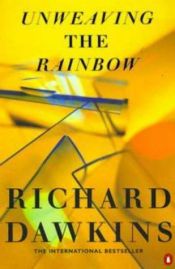Unweaving the Rainbow: Science, Delusion and the Appetite for Wonder
Blurb
Unweaving the Rainbow is a 1998 book by Richard Dawkins, discussing the relationship between science and the arts from the perspective of a scientist.Dawkins addresses the misperception that science and art are at odds. Driven by the responses to his books The Selfish Gene and The Blind Watchmaker wherein readers resented his naturalistic world view, seeing it as depriving life of meaning, Dawkins felt the need to explain that, as a scientist, he saw the world as full of wonders and a source of pleasure. This pleasure was not in spite of, but rather because he does not assume as cause the inexplicable actions of a deity but rather the understandable laws of nature.
His starting point is John Keats' well-known, light-hearted accusation that Isaac Newton destroyed the poetry of the rainbow by 'reducing it to the prismatic colours.' The agenda of the book is to show the reader that science does not destroy, but rather discovers poetry in the patterns of nature.

 English
English Español
Español Deutsch
Deutsch










Member Reviews Write your own review
Be the first person to review
Log in to comment